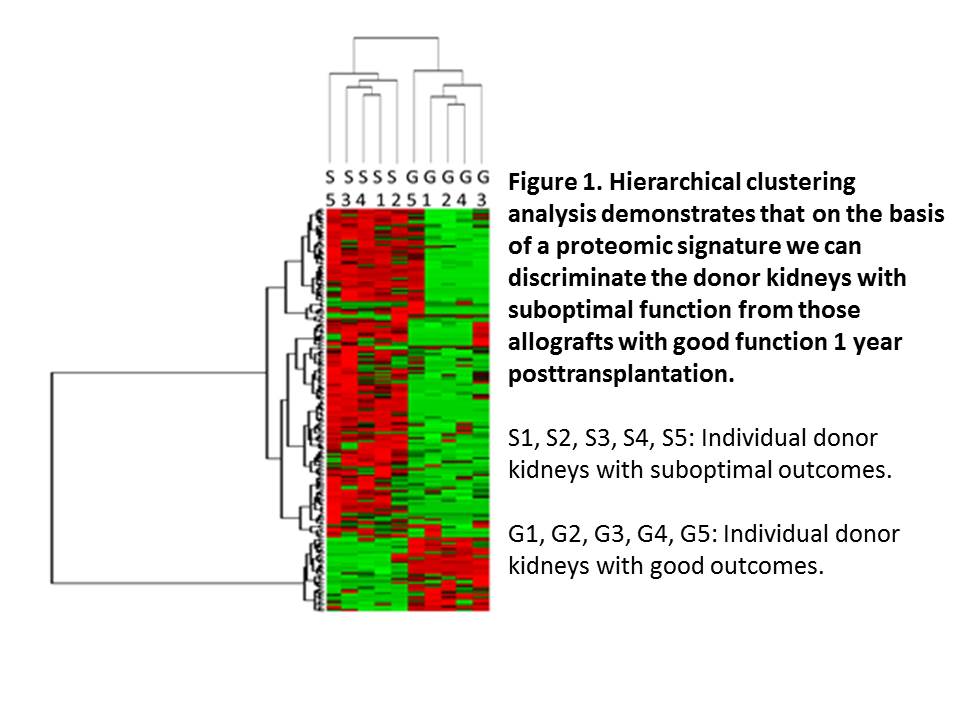Proteomic Profiles of Deceased Donor Kidney Biopsies Obtained Prior to Transplantation Correlate with Allograft Function at One Year.
1Nuffield Department of Surgical Sciences, University of Oxford, Oxford, United Kingdom
2Target Discovery Institute, Nuffield Department of Medicine, University of Oxford, Oxford, United Kingdom
Meeting: 2017 American Transplant Congress
Abstract number: 456
Keywords: Inflammation, Kidney transplantation, Prognosis, Renal dysfunction
Session Information
Session Name: Concurrent Session: Optimizing Donor Utilization: All Organs
Session Type: Concurrent Session
Date: Tuesday, May 2, 2017
Session Time: 2:30pm-4:00pm
 Presentation Time: 3:06pm-3:18pm
Presentation Time: 3:06pm-3:18pm
Location: E353B
Introduction:
Cerebral injury during Donation after Brain Death (DBD) will induce a systemic inflammatory response affecting immediate kidney function and survival posttransplantation. Assessment of donor organ quality prior to transplant that can predict transplantation outcomes will improve donor organ utilisation and provide monitoring tools for novel targeted interventions to resuscitate donor organs.
Methods:
DBD kidney biopsies obtained at retrieval (n=38) were provided by the UK QUOD biobank. Biopsy samples were selected from donors from whom both kidneys were transplanted and had the same posttransplantation outcomes; either suboptimal (SO) or good (GO). Kidneys with SO (n=19) had all developed delayed graft function (DGF) and had a mean 1yr eGFR 35 +/- 6ml/min. Kidneys with GO (n=19) had all functioned immediately and had a mean 1yr eGFR 73 +/-18ml/min. Demographic confounders for outcome include age, cold ischaemia, AKIN and Remuzzi scoring were matched. Samples were analysed by clinical proteomics (n=10) and candidate markers then validated by immunoblotting on a separate cohort of donor kidney samples (n=28).
Results:
Remuzzi scoring and AKIN classification showed no evidence of acute or chronic kidney injury in the donor kidneys. However, proteomic analysis could differentiate between the donor kidneys that had SO from those with GO posttransplantation. Validation of candidate markers supported this discrimination and showed that degradation of glomerular basement membrane proteins, pro-fibrotic and apoptotic markers correlated with SO allograft function while increased antioxidant protein levels were associated with GO allografts. Discussion:
Discussion:
This study suggests that proteomic profiling of pretransplant donor kidneys may correlate with posttransplant outcomes at 1yr. This is a first, step towards clinical validation to better support clinical decision making whether to accept or decline a donor kidney.
CITATION INFORMATION: Kaisar M, van Dullemen L, Akhtar Z, Huang H, Kessler B, Ploeg R. Proteomic Profiles of Deceased Donor Kidney Biopsies Obtained Prior to Transplantation Correlate with Allograft Function at One Year. Am J Transplant. 2017;17 (suppl 3).
To cite this abstract in AMA style:
Kaisar M, Dullemen Lvan, Akhtar Z, Huang H, Kessler B, Ploeg R. Proteomic Profiles of Deceased Donor Kidney Biopsies Obtained Prior to Transplantation Correlate with Allograft Function at One Year. [abstract]. Am J Transplant. 2017; 17 (suppl 3). https://atcmeetingabstracts.com/abstract/proteomic-profiles-of-deceased-donor-kidney-biopsies-obtained-prior-to-transplantation-correlate-with-allograft-function-at-one-year/. Accessed February 17, 2026.« Back to 2017 American Transplant Congress
